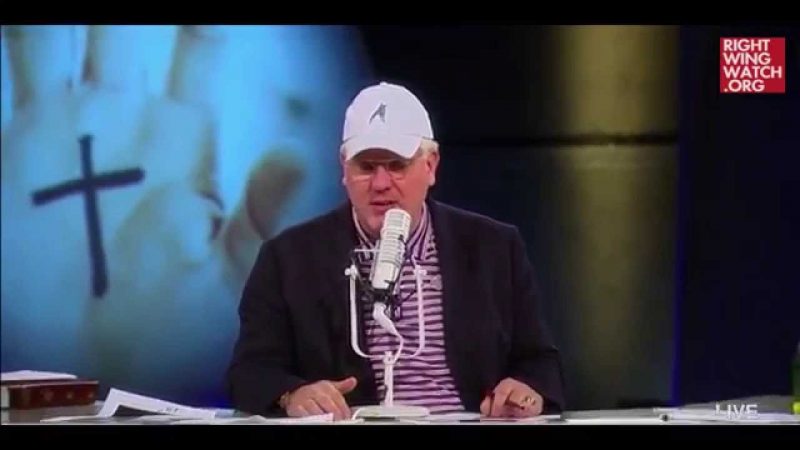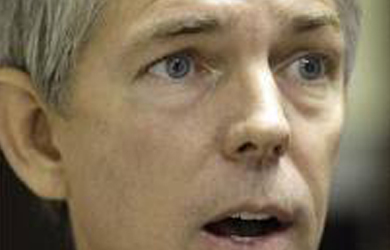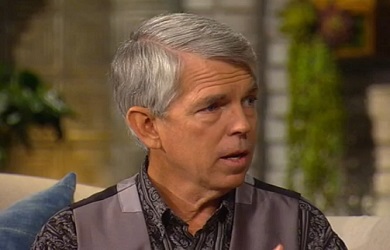Back in 2012, Religious Right pseudo-historian David Barton published his book “The Jefferson Lies: Exposing the Myths You’ve Always Believed About Thomas Jefferson,” through which he sought to portray Jefferson as someone who would make today’s Religious Right seem moderate by comparison.
In response to Barton’s book, Warren Throckmorton, a professor at Grove City College, began to expose Barton’s long track record of producing shoddy works of “history” and, with a fellow Grove City professor, co-authored a response to Barton’s book called “Getting Jefferson Right: Fact Checking Claims about Our Third President.”
As a result, Barton’s work came under increasing scrutiny and Thomas Nelson Publishing pulled his book from publication. Jay Richards, a senior fellow at the Discovery Institute, a Creationist think tank, emerged as a top critic of Barton’s disreputable scholarship within the Religious Right and was so alarmed by it that he asked Gregg Frazer, a history professor at Master’s College, a Christian university in California, to review some of Barton’s work, most notably his popular DVD “America’s Godly Heritage.”
After viewing it, Frazer wrote an utterly scathing review of Barton’s work for Richards, which Richards then reportedly used in making the case to others in the Religious Right movement that Barton’s historical scholarship cannot and should not be trusted.
Today, with Frazer’s permission, Throckmorton posted a copy of his review of Barton’s DVD on his website and it is absolutely devastating.
Frazer’s review is thirteen pages long and exposes the myriad ways in which Barton routinely and intentionally misrepresents American history in order to bolster his own radical right-wing political agenda. Many of the problems that Frazer highlights will be familiar to readers of this blog, as we have covered several of them in the past as well, but the report is well worth reading as it systematically debunks a wide array of Barton’s favorite talking points, such as his tendency to credit everything with which he agrees as having come from the “Founding Fathers”:
This leads to one last area of concern in America’s Godly Heritage which can best be expressed as a question: Who counts as a “Founding Father?” This issue reappears frequently in Barton’s works. He seems to count anyone of whom he approves who was living at the time of the Revolution, the founding of the political system under the Constitution, or within fifty or sixty years of those times as a “Founding Father.” For example, he says that “the American Tract Society was started by the Founding Fathers.” First, not one of those listed as a Tract Society founder signed the Constitution or the Declaration of Independence. By what standard are they “Founding Fathers?” Furthermore, the Society was started in 1825 – 36 years after the Constitution was ratified. Madison was the last living framer an d he died in 1836. How many Founding Fathers were even alive in 1825? Similarly, in his discussion of Vidal v. Girard, he said it was decided in “the time of the Founders.” It was decided in 1844 –55 years after the Constitution went into effect and, a s was just mentioned, the last framer died in 1836! Barton refers to John Quincy Adams as a “Founding Father.” At the time of the Constitutional Convention, he was a 20 year-old just out of law school (he was 8 when the Declaration was signed) – by what standard is he a “Founding Father?” Barton also claims that the “Founding Fathers” established the New England Primer as a text, but the Founding Fathers did not establish any texts for schools – that was left to local communities to decide. Apparently, by Barton’s standards (whatever they are), local school boards were “Founding Fathers.” Finally, Barton says that the state constitutions indicate that the “Founding Fathers” wanted to be sure that Christians held public office. But the Founding Fathers, in Article VI of the Constitution, specifically disallowed any religious test for office. That would seem to be a strange and counterproductive prohibition to be put in place by those who want to ensure that Christians hold the various offices.
It is worth noting that, according to Throckmorton, this review has been in circulation among Religious Right leaders since 2012 and it does not appear to have diminished Barton’s reputation among them in the least, nor has it stopped Barton from routinely peddling misinformation.







